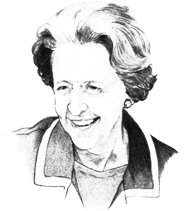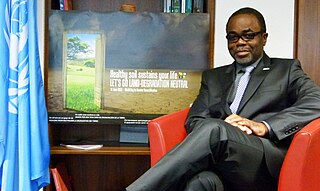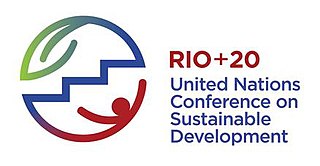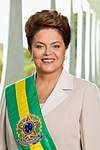This article needs to be updated.(February 2019) |
Teixeira is devoted to reversing the deforestation of the Amazon Rainforest, and achieved an 84% reduction in deforestation from 2004 to 2012, a "remarkable feat that is a tribute to her courage to push against the tide of destruction and is a significant initiative from Brazil on climate change mitigation". Her land-use planning policies saved 250,000 km2 of conservation areas—the equivalent of 75 percent of protected forests in the world. [7]
From August 2012 to July 2013, the rate of deforestation increased by 29% in the Amazônia Legal (Legal Amazon), [9] and from 2013 to 2014, it rose by 358%. [10] With Teixeira as Environment Minister, Brazil has also refused to sign the anti-deforestation pledge that aims to reduce deforestation by 2030, dealing a blow to the Climate Change summit that took place in New York in October 2014. “Unfortunately, we were not consulted,” Brazil’s Environment Minister Izabella Teixeira told the Associated Press. [11]
2014 FIFA World Cup
On 24 May 2014, Teixeira announced a pollution-reducing initiative aimed at making the 2014 FIFA World Cup the most environmentally friendly ever by allowing companies to buy carbon credits in exchange for the right to advertise themselves as official “green seal” World Cup sponsors. In addition, along with the United Nations Environment Program, Teixeira launched a project called “green passport” that promoted sustainable tourism. [12]
Related Research Articles

The United Nations Environment Programme (UNEP) is responsible for coordinating responses to environmental issues within the United Nations system. It was established by Maurice Strong, its first director, after the United Nations Conference on the Human Environment in Stockholm in June 1972. Its mandate is to provide leadership, deliver science and develop solutions on a wide range of issues, including climate change, the management of marine and terrestrial ecosystems, and green economic development. The organization also develops international environmental agreements; publishes and promotes environmental science and helps national governments achieve environmental targets.

The Amazon rainforest, also called Amazon jungle or Amazonia, is a moist broadleaf tropical rainforest in the Amazon biome that covers most of the Amazon basin of South America. This basin encompasses 7,000,000 km2 (2,700,000 sq mi), of which 6,000,000 km2 (2,300,000 sq mi) are covered by the rainforest. This region includes territory belonging to nine nations and 3,344 indigenous territories.

The United Nations Conference on Environment and Development (UNCED), also known as the Rio de JaneiroConference or the Earth Summit, was a major United Nations conference held in Rio de Janeiro from 3 to 14 June 1992.

Barbara Mary Ward, Baroness Jackson of Lodsworth, was a British economist and writer interested in the problems of developing countries. She urged Western governments to share their prosperity with the rest of the world and in the 1960s turned her attention to environmental questions as well. She was an early advocate of sustainable development before this term became familiar and was well known as a journalist, lecturer and broadcaster. Ward was adviser to policymakers in the UK, United States and elsewhere. She is the founder of the International Institute for Environment and Development (IIED).

The United Nations Environment Programme (UNEP) established Champions of the Earth in 2005 as an annual awards programme to recognize outstanding environmental leaders from the public and private sectors and from civil society.
The International Institute for Environment and Development (IIED) is an independent policy research institute whose stated mission is to "build a fairer, more sustainable world, using evidence, action and influence in partnership with others." Its director is Dr Tom Mitchell.

Luc-Marie Constant Gnacadja or simply Luc Gnacadja is a Beninese politician and architect. He was Executive Secretary of the United Nations Convention to Combat Desertification from 2007 to 2013.

The United Nations Forum on Forests (UNFF) is a high-level intergovernmental policy forum. The forum includes all United Nations member states and permanent observers, the UNFF Secretariat, the Collaborative Partnership on Forests, Regional Organizations and Processes and Major Groups.

Felix Dodds, born Michael Nicholas Dodds, is a British author, futurist, and activist.

Avoided Deforestation Partners, or AD Partners, is a non-profit organization under the auspices of the Center for International Policy in Washington, D.C. AD Partners is involved in the global effort to solve climate change by working to end deforestation in tropical rainforest countries. By avoiding the practice of deforestation, i.e., clearing forests to provide inexpensive farmland, potential carbon emissions are prevented. In addition, avoiding deforestation also allows forests to sequester carbon and scrub the air of pollutants. Beyond protecting the Earth's air quality, tropical forests facilitate conditions for rain, replenish water sources, provide habitats for myriad plant and animal species, and sustain the livelihoods of 1.6 billion people globally. Leading scientists and economists say that ending deforestation is the most cost effective and scalable method of reducing greenhouse gases. In fact, they believe that ending deforestation will cut the timeframe for solving the climate crisis in half.

The United Nations Conference on Sustainable Development (UNCSD), also known as Rio 2012, Rio+20, or Earth Summit 2012 was the third international conference on sustainable development aimed at reconciling the economic and environmental goals of the global community. Hosted by Brazil in Rio de Janeiro from 13 to 22 June 2012, Rio+20 was a 20-year follow-up to the 1992 United Nations Conference on Environment and Development (UNCED) held in the same city, and the 10th anniversary of the 2002 World Summit on Sustainable Development (WSSD) in Johannesburg.

The International Day of Forests was established on the 21st day of March, by resolution of the United Nations General Assembly on November 28, 2013. Each year, various events celebrate and raise awareness of the importance of all types of forests, and trees outside forests, for the benefit of current and future generations. Countries are encouraged to undertake efforts to organize local, national, and international activities involving forests and trees, such as tree planting campaigns, on International Day of Forests. The Secretariat of the United Nations Forum on Forests, in collaboration with the Food and Agriculture Organization, facilitates the implementation of such events in collaboration with governments, the Collaborative Partnership on Forests, and international, regional and subregional organizations. International Day of Forests was observed for the first time on March 21, 2013.

The International Resource Panel is a scientific panel of experts that aims to help nations use natural resources sustainably without compromising economic growth and human needs. It provides independent scientific assessments and expert advice on a variety of areas, including:

Amina Jane Mohammed is a Nigerian-British diplomat and politician who is serving as the 5th Deputy Secretary-General of the United Nations. Previously, she was Nigerian Minister of Environment from 2015 to 2016 and was a player in the Post-2015 Development Agenda process. She is also Chair of United Nations Sustainable Development Group.
The United Nations Non-Governmental Liaison Service is a programme of the United Nations mandated to promote and develop constructive relations between the United Nations and civil society organizations. UN-NGLS operates autonomously across the United Nations system and with civil society constituencies and social movements on cross-cutting and emerging issues on the UN agenda. For example, UN-NGLS currently focuses on the UN General Assembly preparatory process for negotiations of a global compact on migration, and high-level events organized by the President of the UN General Assembly. UN-NGLS advises civil society organizations on opportunities to engage with the UN and facilitates their participation in various UN processes and events. UN-NGLS has offices at UN headquarters in New York and is part of the United Nations Department of Global Communications.

In the United Nations, the Post-2015 Development Agenda was a set of talks and discussions that led to the creation of the 2016 Sustainable Development Goals. This replaced the 2015 Millennium Development Goals.

Deforestation is a primary contributor to climate change, and climate change affects the health of forests. Land use change, especially in the form of deforestation, is the second largest source of carbon dioxide emissions from human activities, after the burning of fossil fuels. Greenhouse gases are emitted from deforestation during the burning of forest biomass and decomposition of remaining plant material and soil carbon. Global models and national greenhouse gas inventories give similar results for deforestation emissions. As of 2019, deforestation is responsible for about 11% of global greenhouse gas emissions. Carbon emissions from tropical deforestation are accelerating.

Climate change in Brazil is mainly the climate of Brazil getting hotter and drier. The greenhouse effect of excess carbon dioxide and methane emissions makes the Amazon rainforest hotter and drier, resulting in more wildfires in Brazil. Parts of the rainforest risk becoming savanna.

Chantal-Line Carpentier is a Canada-born Head of Trade, Environment, Climate and Sustainable Development, of UN Trade and Development’s (UNCTAD) Division on International Trade and Commodities following 7 years as Chief of UNCTAD in New York. She is a strong supporter of the United Nations Sustainable Development Goals and in particular SDG12 concerned with responsible and sustainable production, climate, the ocean economy, and biodiversity with a trade and development perspective.

The Amazon Fund is an initiative created by the Brazilian Government and managed by the National Bank for Economic and Social Development (BNDES). It was established on 1 August 2008, with the aim of attracting donations for non-reimbursable investments in actions for the prevention, monitoring, and combat of deforestation, and for the promotion of conservation and sustainable use of the Amazon rainforest. Additionally, the fund supports the development of monitoring and control systems for deforestation in the rest of Brazil and in other tropical countries.
References
- ↑ "Izabella Teixeira (Brazil)". United Nations . Retrieved 16 January 2016.
- ↑ "Costa Rica named 'UN Champion of the Earth' for pioneering role in fighting climate change". Champions of the Earth. 20 September 2019.
- 1 2 "Izabella Teixeira". UN Secretary-General’s High-level Panel on Global Sustainability (GSP). Retrieved 16 January 2016.
- ↑ Ana Nicolaci da Costa (16 December 2010). "Brazil incoming govt confirms another 3 ministers". Thomson Reuters Foundation. Archived from the original on 25 December 2010. Retrieved 11 July 2014.
- ↑ Zachary Shahan (28 October 2010). "Brazil's Minister of the Environment: "The time for talking is over. It is time for providing answers, solutions, actions."". EcoLocalizer. Archived from the original on 5 March 2016. Retrieved 2014-03-26.
- ↑ Jim Efstathiou Jr. (10 December 2010). "Brazil Says UN's Proposal on Kyoto Accord Text Sends Is Best You Get". Bloomberg.
- 1 2 "2013 Laureate – Policy Leadership (co-winner) Izabella Teixeira". United Nations Environment Programme. Retrieved 11 July 2014.
- ↑ UN Press Release (24 September 2012). "Secretary-General Appoints Izabella Teixeira of Brazil to His High-Level Panel of Eminent Persons on Post-2015 Development Agenda".
- ↑ "Desmatamento na Amazônia cresceu 29% entre 2012-2013".
- ↑ "Desmatamento na Amazônia sobe 358% em apenas 1 ano". 21 July 2014.
- ↑ "Climate Change summit: Brazil refuses to sign UN's pledge to slow". 24 September 2014.
- ↑ "Brazil Scores a Green Goal for the Football World Cup". Green Action News. 2 June 2014.
Izabella Teixeira | |
|---|---|
 | |
| Minister of Environment | |
| In office 30 March 2010 –12 May 2016 |
